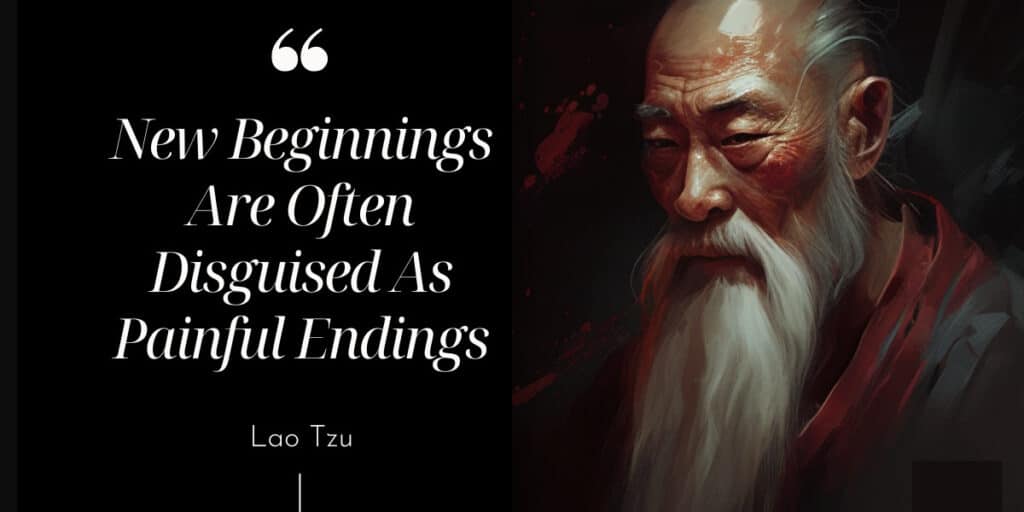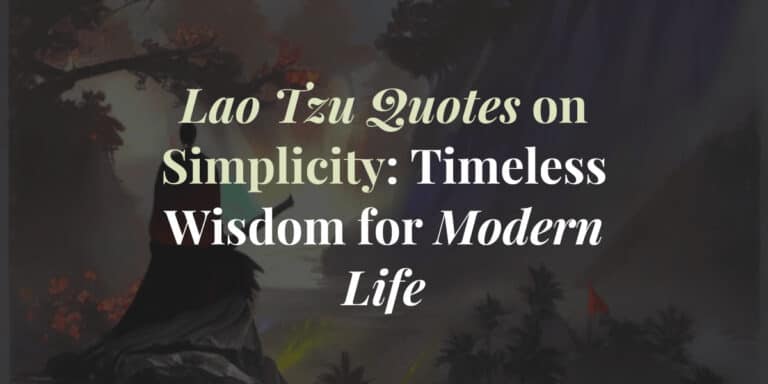New Beginnings Are Often Disguised As Painful Endings – Lao Tzu
As the ancient Chinese philosopher Lao Tzu once said, “New beginnings are often disguised as painful endings.” Starting something new can be both exciting and intimidating, and it’s often said that the biggest growth comes from stepping outside of our comfort zones. However, it’s also natural to feel a sense of loss or sadness when we leave behind something familiar.

This quote speaks to the idea that change, even when it brings the potential for positive growth and new opportunities, can also be difficult and unsettling. It suggests that endings, whether they be the end of a job, a relationship, or a phase of life, are often necessary in order for new beginnings to take shape.
In this post, we will explore the meaning of Lao Tzu’s quote and the importance of embracing change and new beginnings. We’ll also offer some tips and strategies for making the most of these opportunities, even when they may be accompanied by a sense of loss or uncertainty.
The Meaning of the New Beginnings Are Often Disguised As Painful Endings
Lao Tzu’s quote suggests that new beginnings are often disguised or hidden within painful endings. This means that the end of something, whether it be a job, a relationship, or a phase of life, can be the catalyst for something new to begin.
These endings can be difficult and unsettling, and it’s natural to feel a sense of loss or sadness when something we have known and relied on comes to an end.
However, it’s important to remember that endings can also bring new opportunities and growth. Just as a seed must die in order for a new plant to grow, endings can mark the start of something new and different. In this way, endings can be seen as a necessary part of the process of growth and change.
It’s also worth noting that Lao Tzu’s philosophy emphasizes the idea of balance and the interconnectedness of all things. In this context, the quote can be interpreted as a reminder that endings and beginnings are not necessarily distinct or separate, but rather two sides of the same coin. They are part of a continuous cycle of change and growth.
Overall, the quote by Lao Tzu encourages us to be open to change and to see endings as a necessary part of the process of growth and new beginnings.
The Importance of Embracing Change
While it’s natural to feel hesitant or resistant to change, it’s important to remember that change can bring new opportunities and growth. Embracing change allows us to move forward and make the most of new beginnings, rather than getting stuck in the past.
Here are a few tips for how to embrace change and make the most of new beginnings:
- Acknowledge your feelings: It’s normal to feel a range of emotions when facing change, including sadness, fear, and uncertainty. Allow yourself to feel and process these emotions, but try not to get stuck in them.
- Seek support: Change can be easier to navigate with the help of others. Consider seeking support from friends, family, or a therapist to help you through the transition.
- Keep an open mind: Try to approach new beginnings with an open mind and a willingness to learn and grow. This can help you make the most of the opportunities that come your way.
- Focus on the present: It can be helpful to let go of the past and focus on the present moment. This can help you move forward and make the most of new beginnings.
Embracing change and being open to new beginnings can be challenging, but it can also bring new opportunities for growth and personal development. It’s important to remember that endings, even when they are painful, can lead to new and exciting beginnings.
Conclusion
In conclusion, the quote “new beginnings are often disguised as painful endings” by Lao Tzu reminds us that change, while sometimes difficult, is a necessary part of life. Endings, whether they be the end of a job, a relationship, or a phase of life, can mark the start of something new and different.
Embracing change and being open to new beginnings can be challenging, but it’s also an opportunity for growth and personal development. By acknowledging our emotions, seeking support, keeping an open mind, and focusing on the present, we can make the most of these opportunities.
We hope this post has helped you reflect on your own experiences with change and new beginnings. If you’re interested in learning more about the philosophy of Lao Tzu and the concept of balance and interconnectedness, there are many resources available for further reading.







